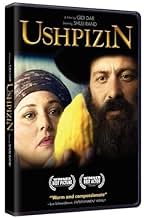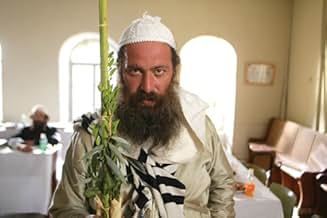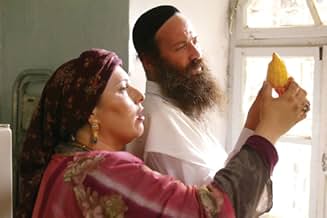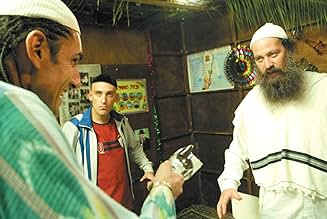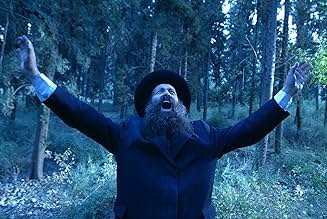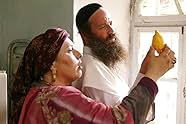AVALIAÇÃO DA IMDb
7,3/10
2,2 mil
SUA AVALIAÇÃO
Adicionar um enredo no seu idiomaAn Orthodox Jewish couple's faith is tested after praying to the Lord for a child on the Succoth holiday.An Orthodox Jewish couple's faith is tested after praying to the Lord for a child on the Succoth holiday.An Orthodox Jewish couple's faith is tested after praying to the Lord for a child on the Succoth holiday.
- Prêmios
- 1 vitória e 4 indicações no total
Daniel Dayan
- The Rabbi
- (as Rabbi Daniel Dayan)
Michael Weigel
- Ethrog Assessor
- (as Michael Vaigel)
Avaliações em destaque
This comedy which received Best Picture award from Israeli Critics in 2004 reveals a world that most of us don't know at all the world of pious, ultra-Orthodox Jews in the Jerusalem courtyards that seem to be indifferent to what century or even millennium is passing by. On the eve of the Jewish harvest holiday of Succoth, Moshe and Mali, a devoutly religious but impoverished couple, pray fervently for a miracle that they desperately need for money they need to build a Sukkah for holiday, for "ushpizin" ("holy guests") to share the holiday with, and for the most wonderful miracle of all, for a child they dream of but don't have. A series of unexpected events occur, including the appearance of two "unholy guests" two escaped parolees from Moshe's wild past. Moshe and Mali invited the guests to share the holiday with them, and more unpredictable events would follow...
"Ushpizin" is the first collaborative effort between Israel's religious and secular communities and it features many non-professionals who gave very good performances in the movie. Shuli Rand, the writer-star of the movie and his real life wife, Michal Bat-Sheva Rand played Moshe and Mali, and their chemistry is palpable and real contributing to this thoroughly charming story of faith, love, and devotion.
"Ushpizin" is the first collaborative effort between Israel's religious and secular communities and it features many non-professionals who gave very good performances in the movie. Shuli Rand, the writer-star of the movie and his real life wife, Michal Bat-Sheva Rand played Moshe and Mali, and their chemistry is palpable and real contributing to this thoroughly charming story of faith, love, and devotion.
For someone unfamiliar with the culture, Ushpizin may be like visiting another planet full of strange people, unfamiliar rules, and absolutely opposite priorities. It quickly becomes a human fable with which all of us can connect deeply, however: the blessings and curses that come with wishes that are granted, the confusion of figuring out how the big picture will play out in our smallest choices, the warmth and pressure of belonging to a wider community of similarly confused and agitated people.
Some of the characters border on lovable stereotypes, and the picture painted is of a world in which good is absolutely guaranteed to conquer evil, but it is nonetheless believable and suspenseful. You really should see it.
Some of the characters border on lovable stereotypes, and the picture painted is of a world in which good is absolutely guaranteed to conquer evil, but it is nonetheless believable and suspenseful. You really should see it.
"Sad to be all alone in the world" WIthout children there is no laughter.... so starts the struggle of a Baal Tshuvah (returnees to Judaisn) family in Israel in the huge Breslower chassidic community. Moshe Balanga is struggling to put food on the table, although it is never explained WHY he doesn't work, he comes home dejected on the eve of the holiday of Sucot only to be told by his wife that his faith is lacking and that he should pray harder. Ushpizen is a look at the guarded frum (religious) community from the inside. No compromises of nudity, sex, violence, foul language are needed to tell this sweet, fast paced, emotional story. I saw it with a mostly Jewish audience, but sat next to a non jew who enjoyed it as much as I did. For all ages, for all walks of life.... You will cry, and you will laugh, and you will cheer when it is over. I can't wait to see it again, I suggest you run to see it when it hits national release in September.
This was a delightful movie in so many ways.
First, I really enjoyed the overall depiction of what was for me a very different cultural setting ... both regarding the religious context (Ultra-Orthodox Judaism) and the geocultural context (contemporary Israel, especially contemporary Jerusalem). I certainly can't comment on authenticity; but the overall flavor was convincing and the often exotic (to me) happenings, sayings, behaviors, etc were to me very appealing.
Second, the characters of Moshe and Malli were simply wonderful and wonderfully appealing. Their relationship was vivid; and the window into how an Orthodox marriage relationship "works" in the context of a strong Faith commitment by both of the couple was such a bracing experience for me.
Third, the general plot-theme ... two escaped convicts showing up and both challenging and straining Hospitality ... is very appealing to me. The characters of the convicts ... Scorpio and Yossef ... were much less appealing but certainly (uh) interesting.
Still the odd relationship between Moshe and Scorpio; and between Moshe and his wife and Scorpio and Yossef ... somehow lacked something that for me I could really find very convincing. The behavior of Scorpio and Yossef toward both their hosts, and to the general religious community on the street in which they were staying, was so attention-provoking that I had to ask myself what kind of escaped convicts want that kind of attention.
Yet all in all I really enjoyed this movie. And if you, like me, find this a pleasing but somewhat mystifying *cultural* challenge, hey, read some of the other comments on IMDb, there are some wonderful comments from Israel in particular that have shed much light for me.
First, I really enjoyed the overall depiction of what was for me a very different cultural setting ... both regarding the religious context (Ultra-Orthodox Judaism) and the geocultural context (contemporary Israel, especially contemporary Jerusalem). I certainly can't comment on authenticity; but the overall flavor was convincing and the often exotic (to me) happenings, sayings, behaviors, etc were to me very appealing.
Second, the characters of Moshe and Malli were simply wonderful and wonderfully appealing. Their relationship was vivid; and the window into how an Orthodox marriage relationship "works" in the context of a strong Faith commitment by both of the couple was such a bracing experience for me.
Third, the general plot-theme ... two escaped convicts showing up and both challenging and straining Hospitality ... is very appealing to me. The characters of the convicts ... Scorpio and Yossef ... were much less appealing but certainly (uh) interesting.
Still the odd relationship between Moshe and Scorpio; and between Moshe and his wife and Scorpio and Yossef ... somehow lacked something that for me I could really find very convincing. The behavior of Scorpio and Yossef toward both their hosts, and to the general religious community on the street in which they were staying, was so attention-provoking that I had to ask myself what kind of escaped convicts want that kind of attention.
Yet all in all I really enjoyed this movie. And if you, like me, find this a pleasing but somewhat mystifying *cultural* challenge, hey, read some of the other comments on IMDb, there are some wonderful comments from Israel in particular that have shed much light for me.
"Ha Ushpizin" is like a cross between Isaac Bashevis Singer and O. Henry stories brought to life in contemporary Jerusalem.
Set just before and during the fall harvest festival of Succoth, it is a modern retelling of the story from Genesis and its accompanying Midrash (extra-Biblical story) of Abraham encouraging guests (the title in Aramaic) to his house, that has become a mitzvah (obligation) for holidays. It is a thoroughly charming story of faith and love - and how maintaining both is a daily struggle requiring patience and humor and can even replace therapy.
What makes the film so involving emotionally is the superb acting. In Q & A at the Tribeca Film Festival the Orthodox writer/star and secular director explained they came up with the film, which was inspired by an actual incident that is used as a plot point, and worked diligently to get rabbinical approval by meeting certain restrictions, in order to put a human face behind the head coverings and beards of the Ultra Orthodox in Israel to help ease the tensions between their community ("the Hats" as they are called in short hand) and the majority secular citizens of Israel.
Shuli Rand was a leading film and theater actor before he gave up a secular life for a religious one, much as his character has only been religious for a few years after a somewhat shady past that in the film literally comes back to haunt him. His wife and co-star Michal Bat-Sheva Rand had been a theater director in her past and only agreed to act in this film as that was one of the rabbi's requirements for approval; a story about a couple had to be portrayed by an actual married pair. Practically swaddled burkha-like and almost as wide as she is tall, she unpredictably dominates the screen and takes it above any other more anthropological film about traditional families from any part of the world.
The modern sociological examinations are limited to having the only secular characters in the film be somewhat stereotyped; the kindliest one can say about them is that they are like citizens of Chelm or descendants of Vladimir and Estragon when they are comic relief or a menacing Laurel and Hardy.
There is some gentle clear-eyed look at the Ultra Orthodox as not serving in the Army and living only on charity that they mostly collect like Hare Krishnas in the street or from guilt-ridden Modern Orthodox businessmen that is then distributed based on the internal politics of their affiliated yeshiva.
I also have qualms about prayer being used for such personal propitiation as the couple do here, but that aspect is directed so delightfully and heartwarmingly that it's Scrooge-like to complain.
The visuals of the community of Mea Shearim, the Ultra-Orthodox Jerusalem neighborhood where the film is set, with the temporary Succoth (booths for outdoor eating) set up throughout of various materials, are marvelous views that outsiders rarely get to see.
When it is released in Fall 2005 in the U.S. (with special screenings set up for the Hassidic communities that cannot attend secular theaters with mixed audiences) I doubt viewers will get to participate in the kind of lively and colorful audience I did at the Museum of Jewish Heritage which included almost every possible age and affiliation of New York Jews, particularly from Brooklyn, and some non-Jewish out-of-towners in for the Festival.
But all the Orthodox attendees wanted to know was how the secular director could not be inspired to take the pledge, as it were, after making such a film? He pointed out that his sound designer was so inspired - who stood up to much cheering from many in the crowd.
Set just before and during the fall harvest festival of Succoth, it is a modern retelling of the story from Genesis and its accompanying Midrash (extra-Biblical story) of Abraham encouraging guests (the title in Aramaic) to his house, that has become a mitzvah (obligation) for holidays. It is a thoroughly charming story of faith and love - and how maintaining both is a daily struggle requiring patience and humor and can even replace therapy.
What makes the film so involving emotionally is the superb acting. In Q & A at the Tribeca Film Festival the Orthodox writer/star and secular director explained they came up with the film, which was inspired by an actual incident that is used as a plot point, and worked diligently to get rabbinical approval by meeting certain restrictions, in order to put a human face behind the head coverings and beards of the Ultra Orthodox in Israel to help ease the tensions between their community ("the Hats" as they are called in short hand) and the majority secular citizens of Israel.
Shuli Rand was a leading film and theater actor before he gave up a secular life for a religious one, much as his character has only been religious for a few years after a somewhat shady past that in the film literally comes back to haunt him. His wife and co-star Michal Bat-Sheva Rand had been a theater director in her past and only agreed to act in this film as that was one of the rabbi's requirements for approval; a story about a couple had to be portrayed by an actual married pair. Practically swaddled burkha-like and almost as wide as she is tall, she unpredictably dominates the screen and takes it above any other more anthropological film about traditional families from any part of the world.
The modern sociological examinations are limited to having the only secular characters in the film be somewhat stereotyped; the kindliest one can say about them is that they are like citizens of Chelm or descendants of Vladimir and Estragon when they are comic relief or a menacing Laurel and Hardy.
There is some gentle clear-eyed look at the Ultra Orthodox as not serving in the Army and living only on charity that they mostly collect like Hare Krishnas in the street or from guilt-ridden Modern Orthodox businessmen that is then distributed based on the internal politics of their affiliated yeshiva.
I also have qualms about prayer being used for such personal propitiation as the couple do here, but that aspect is directed so delightfully and heartwarmingly that it's Scrooge-like to complain.
The visuals of the community of Mea Shearim, the Ultra-Orthodox Jerusalem neighborhood where the film is set, with the temporary Succoth (booths for outdoor eating) set up throughout of various materials, are marvelous views that outsiders rarely get to see.
When it is released in Fall 2005 in the U.S. (with special screenings set up for the Hassidic communities that cannot attend secular theaters with mixed audiences) I doubt viewers will get to participate in the kind of lively and colorful audience I did at the Museum of Jewish Heritage which included almost every possible age and affiliation of New York Jews, particularly from Brooklyn, and some non-Jewish out-of-towners in for the Festival.
But all the Orthodox attendees wanted to know was how the secular director could not be inspired to take the pledge, as it were, after making such a film? He pointed out that his sound designer was so inspired - who stood up to much cheering from many in the crowd.
Você sabia?
- CuriosidadesShuli Rand had two conditions for making this movie, both were met. The first was that his real-life wife, Michal Bat-Sheva Rand, would play his wife in the film. The second is that in Israel the film would not be screened on the Jewish Sabbath.
- Citações
[from trailer]
Narrator: They worked out of luck, out of hope. And faith was all they had to hang on to. But on this holy week, where guests are considered a blessing, these two unexpected visitors bring with them: a secret from the past. A secret that would test their love and challenge their faith. Now only a miracle will turn their fortune around.
- ConexõesFeatured in Sharon Amrani: Remember His Name (2010)
Principais escolhas
Faça login para avaliar e ver a lista de recomendações personalizadas
Detalhes
- Data de lançamento
- País de origem
- Central de atendimento oficial
- Idiomas
- Também conhecido como
- Visitantes
- Locações de filme
- Empresa de produção
- Consulte mais créditos da empresa na IMDbPro
Bilheteria
- Faturamento bruto nos EUA e Canadá
- US$ 1.400.666
- Fim de semana de estreia nos EUA e Canadá
- US$ 64.423
- 23 de out. de 2005
- Faturamento bruto mundial
- US$ 1.565.016
Contribua para esta página
Sugerir uma alteração ou adicionar conteúdo ausente

Principal brecha
By what name was Ha-Ushpizin (2004) officially released in India in English?
Responda




